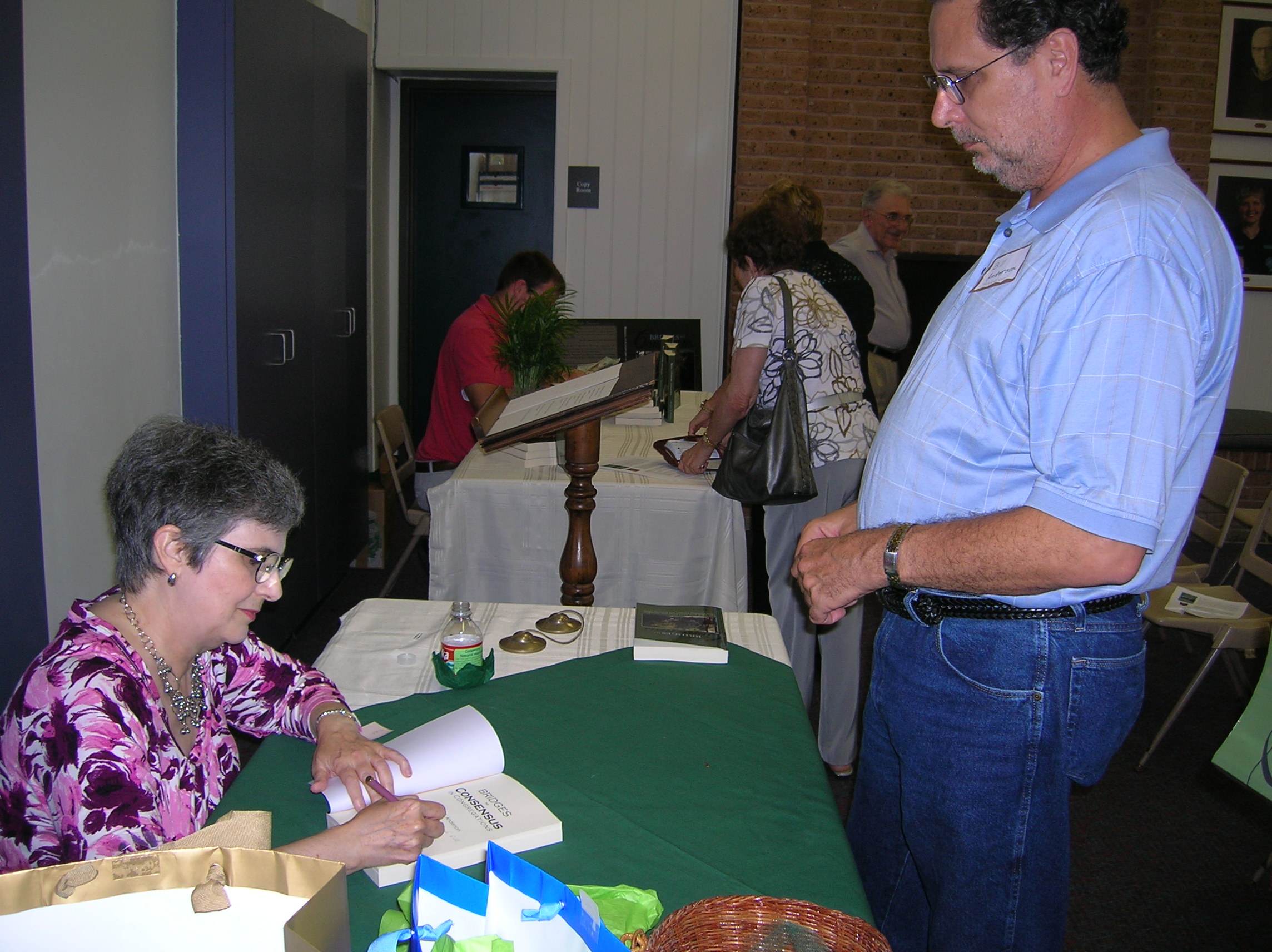[Image is Margaret at a book signing.]
Our brains are wired to focus on our differences when we disagree with someone. But in order to persuade or build consensus with that person, look for common ground and build from there. It’s hard to look for common ground when you’re in the thick of a stressful argument. But you can develop commonality-seeking skill. Practice by looking for common ground in other people’s disagreements, where you have little or nothing at stake. Then, finding common ground in your own disagreements will come more naturally.
I recently practiced seeking commonalities in a difference of opinion between blogger Catherine Onyemelukwe and her spouse, Clem. Catherine had blogged, “Every year my husband complains…’You Unitarians don’t believe in Christ. So why do you celebrate Christmas?’” Catherine continued, “I’ve tried many explanations; none is satisfactory. Do you have an answer for…his questions?”
Ideas of what it means to “believe in Christ” vary widely. People may mean one or more of the following:
- Jesus is God.
- Jesus was the son of God.
- Jesus actually performed miracles, like walking on water.
- By his death, Jesus saved us from “original sin.”
- By his death, Jesus made it possible for you to be saved if you get baptized.
- Everything in 5 above, plus get baptized by total immersion.
- Everything in 6 above, plus stand up in church and testify that Jesus saved you.
And other variations.
But I see common ground in all kinds of Christians, not in what they believe about Jesus, but in what they do in practice. The majority of Christians try to live by the teachings and good examples attributed to Jesus in the gospels.
The teachings and behaviors actually described in the gospels mostly boil down to opening up one’s heart and mind, treating others with love, kindness, generosity. Jesus reached out to the marginalized, those his peers looked down on—lepers, tax collectors, Samaritans, prostitutes, and women in general.
It seems that Jesus’s earliest followers, those closest to him in history and memory, understood the main thrust of his teachings as I do. They reached out and helped others. Some groups pooled resources so that everyone got enough to eat.
Unitarian Universalism [sometimes referred to as “UU” hereafter] does not require belief in Christ or any other dogma. But it doesn’t forbid belief in dogma either. Some UUs, even some ministers, identify as Christians. But more importantly, UU-ism focuses on helping others, especially the disadvantaged.
Justice Potter Stewart famously said that he couldn’t define hard core porn, “but I know it when I see it.” Similarly, many people recognize a spirit of Christmas, even if no authority has officially defined it. However, Dickens did describe it in A Christmas Carol. Scrooge’s nephew Fred says:
I have always thought of Christmas time, when it has come round–apart from the veneration due to its sacred name and origin, if anything belonging to it can be apart from that–as a good time; a kind, forgiving, charitable, pleasant time; the only time I know of…when [people] seem by one consent to open their shut-up hearts freely, and to think of people below them as if they really were fellow-passengers to the grave, and not another race of creatures bound on other journeys. And therefore, uncle, though it has never put a scrap of gold or silver in my pocket, I believe that it has done me good, and will do me good; and I say, God bless it!” [Emphasis mine]
Through Fred, Dickens, an Anglican, suggests that he doesn’t know if we can separate this “kind, forgiving, charitable” spirit from it’s religious associations, but whether or not we can separate it, that spirit clearly prevails at Christmas time. I submit that celebrating Christmas, whether in church or around the family dinner table, fosters that spirit.
The Christian gospels, the early followers of Jesus, Unitarian Universalism, and the spirit of Christmas share commonalities in their very essences: kindness, generosity, opening our “shut-up hearts freely,” and helping those less fortunate. Celebrating Christmas helps people get into that “kind, forgiving, charitable” spirit. In that spirit, people are more likely to do what Jesus wanted—help others.
Yes, people get frenzied and stressed about decorating, shopping and cooking. Sometimes they lose their tempers. Some people steal presents from front porches and cars.
But more often, I notice people being more friendly, polite and generous at this time of year. They smile and greet strangers. Saturday, the baking supplies aisle at HEB was gridlocked. Yet, no one groused, pushed or shoved. Rather, they held back and gestured others to pass them. A thief stole presents from a woman’s car in a repair shop yard. Ordinary people quickly replaced the presents.
A Christmas service inspires people to be open, kind and generous whether the service is based on gospel, Christian history, the UU Seven Principles, the spirit of Christmas, or something else. In turn, people who feel the spirit of Christmas are more receptive to the service’s message of kindness, more likely to act on it.
Don’t we want all people to enter into this “kind, forgiving, charitable” spirit of Christmas, no matter what they do or don’t believe? Don’t we wish everyone would reach out generously to those who aren’t as fortunate?
So, taking a cue from Scrooge’s nephew, I think that, if Catherine’s church’s Christmas service inspires kindness and generosity, then it has done the world good, and will do the world good; and I say, God bless it, with all its commonalities!


There is another thing, or I should say another person, sharing common ground with both Anglicanism and Unitarian Universalism: Charles Dickens. The online Dictionary of Unitarian Universalist Biography states, “Although Dickens was baptized and reared in the Church of England and was a nominal Anglican for most of his life, he turned to Unitarianism in the 1840s as a Broad Church alternative.”